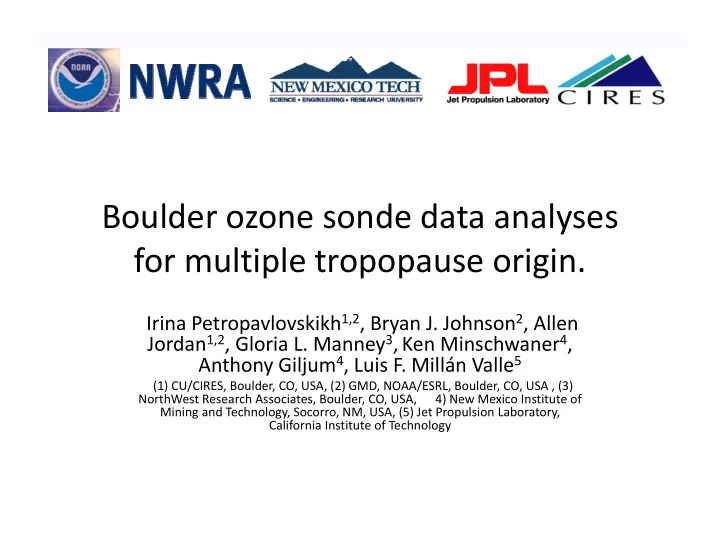

Boulder ozone sonde data analyses for multiple tropopause origin. Irina Petropavlovskikh 1,2 , Bryan J. Johnson 2 , Allen Jordan 1,2 , Gloria L. Manney 3 , Ken Minschwaner 4 , Anthony Giljum 4 , Luis F. Millán Valle 5 (1) CU/CIRES, Boulder, CO, USA, (2) GMD, NOAA/ESRL, Boulder, CO, USA , (3) NorthWest Research Associates, Boulder, CO, USA, 4) New Mexico Institute of Mining and Technology, Socorro, NM, USA, (5) Jet Propulsion Laboratory, California Institute of Technology
Ozone sonde from Boulder, CO, June 20, 2014 Large lamina at ~ 14 and 10 km Lamiae causes in ozonesonde data • High ozone is transported from stratosphere to the location of measurements • Striation is generated by local gravity wave perturbations Also, ozone from the TTL can be transported into regions with multiple tropopauses over the middle latitudes in the vicinity of the subtropical jets
SEACIONS, Boulder, June 20, 2014, lamination analysis Rossby waves Gravity waves Grant et al, 1998 Thompson et al., 2007, 2008
Statistics on frequency and amplitude of lamina over Boulder (after 1991) Frequency, % Amplitude, % Altitude (km) Altitude (km) 2 4 6 8 10 12 2 4 6 8 10 12 Month number Month number
Ozone and jets: why Boulder?
GMAO Data Assimilation System (DAS) Ozone Fields • “GEOS‐591”: Current operational, high resolution product, 0.5x0.675 degree (latitude x longitude) – Only SBUV ozone is assimilated, so input ozone fields do not represent fine vertical scale structure – structure is reproduced when it is caused mostly by transport of larger scale features. • “ MERRA‐2 ”: Modern Era Retrospective analysis for Research and Applications, version 2 – a high resolution (0.5x0.675 degree) reanalysis from 1979 through the present, available every three hours – assimilates Aura Microwave Limb Sounder (MLS) stratospheric profile and Ozone Monitoring Instrument (OMI) column ozone data, as described by Wargan et al. (2015, JGR) See further information about GMAO products at http://gmao.gsfc.nasa.gov/research/merra/ and Bosilovich et al., 2015, NASA/TM– 2015‐104606/Vol. 43, available from http://gmao.gsfc.nasa.gov/pubs/office_notes .
MERRA Ozone variability at 350 K Plot is provided by JPL
Meridional cross section map Double tropopause at latitude of Boulder June 19,2014
June 20, 2014, balloon launch at 18 UT
RDF Analysis • Back‐trajectories initialized at 100 closely‐spaced potential temperature levels over Boulder are used as a simple model of the transport of Aura Microwave Limb Sounder (MLS) ozone. • Trajectories are driven by MERRA winds and heating rates (for vertical motion in isentropic coordinates), • Transport by MERRA winds is generally not expected to capture laminae generated by GWs, but should capture features generated by differential advection by the large‐scale winds.
RDF analysis for June 20, 2014 Boulder Elevate ozone (statospheric origin, PVU >4.5) is transported to Boulder (40 N) from high latitudes along the isentrope surface (constant Theta levels). Plot is provided by JPL
MERRA matched with Ozone Profile Plot is provided by JPL
SEACIONS, Boulder, June 20, 2014, lamination analysis Rossby waves Gravity waves Grant et al, 1998 Thompson et al., 2007, 2008
Results • The RDF does seem to capture many of the features, though sometimes with a slight offset. Cases where RDF misses a feature in the 340‐350K is if the lamina was caused by gravity waves. The RDF only captures the effects of large scale differential (from different places at different altitudes) transport. • In addition, observations indicate that air from the tropical tropopause layer (TTL) can be transported into regions with multiple tropopauses over the middle latitudes in the vicinity of the subtropical jets. • Detailed studies of several ozone profiles collected over Boulder in June/July 2014 help with determining techniques for future analysis of a larger dataset that goes back to 1978.
Summary • We use GMAO's GEOS‐5 data assimilation system products, including Modern‐Era Retrospective analysis for Research and Applications (MERRA), interpolated to Boulder, Colorado, USA (40N, 105W) to assess incidence of upper tropospheric jets that influence UTLS ozone distribution. The proximity of the subtropical jet to Boulder results in frequent observations of multiple tropopauses. • Our tools include back trajectory analysis coupled with 4D satellite ozone profile data, including those from NASA's V3.3 Aura Microwave Limb Sounder (MLS) and Ozone Monitoring Instrument (OMI) • Filaments causing laminae in ozone profiles observed at Boulder are tracked to origins in either stratospheric or tropospheric intrusions using reverse domain‐filling (RDF) trajectory methods. • Ozone variability in the UTLS over Boulder is of importance for studies of local climatological ozone conditions, their causes/attribution, and with regard to EPA ozone regulations at the mountain sites across the USA.
Recommend
More recommend